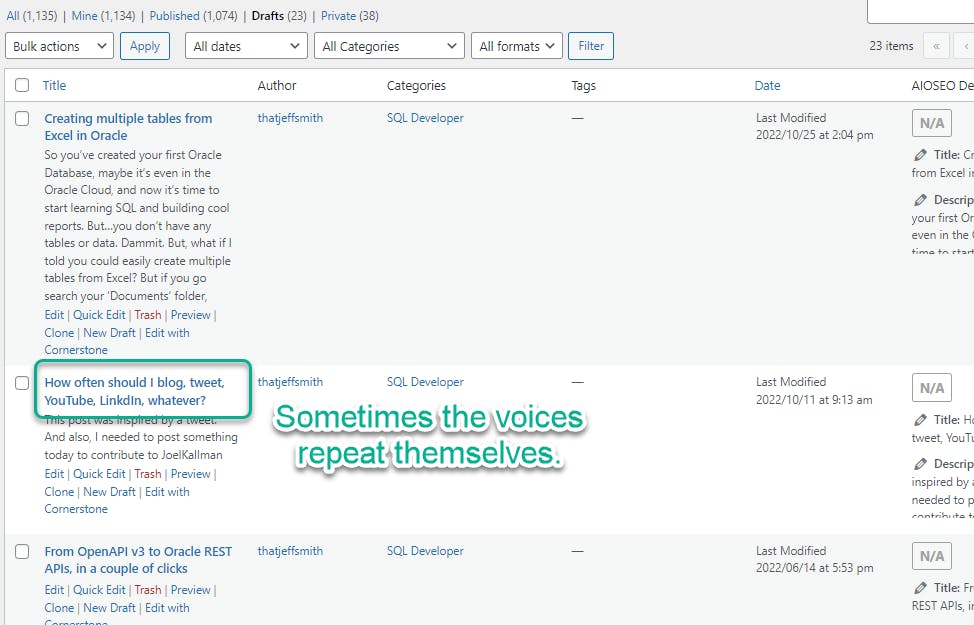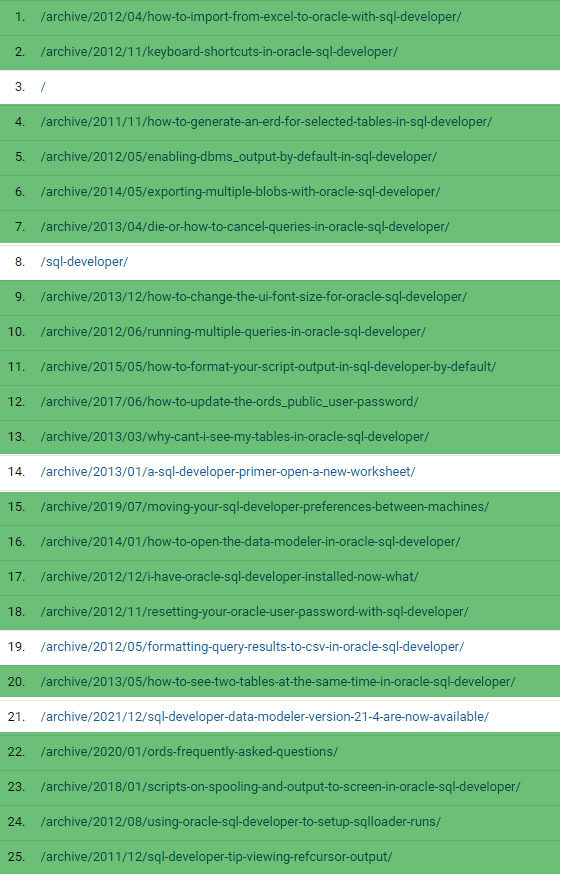When do you know it's time to write, and what do you write about?
A technical manager shares their experience bothering people online.
Writers like to write. And the only way to get better at something is to do it. I'm often a broken record, advising folks to 'always be writing!'
But enough with the platitudes and clichés you might see on a motivational poster! I want to talk to people who like to write, but aren't sure what they should be writing about.
And by 'people,' I mean product managers, evangelists, subject matter experts, presales engineers, support engineers, and anyone technical who interacts with human beings regularly.
Have something to say? Let it out!
That's where this post came from. I had words, thoughts, and ramblings crawling around inside my skull. And for me, writing can be therapeutic, or at least a way to crystallize a rambling into a coherent thought or even plan of action.
Usually, those words or thoughts escape as Tweets.
Sometimes I'll go to start to write, and I find the post goes nowhere. And that's OK! If I pull up my WordPress blog, I have more than a few stories 'stuck' in DRAFT.

TIP: Whenever you have an idea, quickly create a DRAFT post with just a Title. You can come back to these later when you're ready to write.
Just for full transparency, I'm not very good at this. Normally if I have an idea, I drop everything and start writing it. If I don't have the time, then the idea normally falls out of my head. I've probably lost quite a few dandy posts that way, Bad Jeff!
80% of all my posts originate from questions.
The other 20% are usually around product updates, marketing or company events, and just the truly random. Examples of this would include stuff like, "Hey, so you want to know more about Oracle Cloud World!"
But by far, the bulk of my content is generated by QUESTIONS. And this is where the product professional in me feels like I have a huge advantage when it comes to writing.
I'm somewhat well-known in my industry, AND I've made myself highly available. As a result, I get many questions and pleas for help. When I decide to respond, if I find my 'answer' or explanation contains:
code samplespictures
and sometimes even pictures of code
...then this is a giant dinner bell ringing. Yes, I could answer the question ONCE on Slack, but then no one other than the OP will ever see or benefit from that bit of detective work.
Instead, I will often answer the question in the form of a blog post. And my co-worker on Slack gets a TL/DR summary, with a link to the blog post. And if my decent SEO skills kick in, then Google does the rest for me in terms of finding readers.
Not only are the bulk of my posts based on questions, by far my most popular posts also fall into this category. If I look at my top 25 most viewed articles (stats from '20-'23 AKA the Covid Years) and highlight the ones that originated from a question...

It's not an accident that the top post is about Excel. It's been the #1 post on my blog since the day I published it. I love/hate this about my blog.
But Jeff, I'm not getting any questions!
Go where the questions are! Twitter, Slack, forums, StackOverflow, hell...Google! What are people searching, asking, and shouting about? Those are your customers, your fans, and your community. Find the things that hurt.
As a product manager, I try to talk to customers every day. Since the pandemic, my customer interactions are nearly 100% virtual. Having a blog and a social media presence to fall back on really rescued me. I couldn't go to conferences, events, or customers' offices, but I COULD continue 'talking' to people.
As a reader, if you find something that helps you, 'feed' the author's soul by leaving them a comment saying so! This makes our day, every time!
Sometimes the questions are my own.
When I'm learning something brand new, it helps to take notes and screenshots documenting my progress. These frequently end up as blog posts. And if I'm being honest...
TIP: WRITE FOR YOURSELF, FIRST.
Writing can seem like a chore to many. That will kill your motivation to write. But, if you write for yourself, you're helping yourself. And we're human, being selfish is who we are. This is why you'll see my humor sneak its way into my technical posts.
If it makes ME laugh, then it goes into the script. Because it keeps me sane, and some vain part of me believes readers like to know how their favorite writers "tick."
I can't believe the number of times I've Googled something, only to be shown a blog post I wrote only a few years or even months ago. My memory is very particular about its recall capabilities. If it's trivia or history based, we're superstars. If it's about a conversation we had with someone yesterday, it might as well never happened. So writing has another benefit, it helps ME remember the content. And if I don't, I'll find it when I need it.
The most recent example of this would be documenting my recent forays into Python and Spatial data.

It took me a long time to get my head wrapped around that block of code. Like, what the heck is the significance of '4326?' Once I figured it out, I knew I had to write that down. And I also reckoned if I had this question, at least one other person will.
And that's often my other requirement for writing a blog post. Will it help me, and could it help at least one other person? The answer is almost always, yes!
Secondary benefits of technical writing
I get at least as much out of writing a post as the actual post delivers, value-wise. Sorry that was awkward, how am I even calling myself a writer? What I mean to say is, I get MUCH more back from a writing exercise than the energy and time I put into producing it.
Teaching something requires more than a passing awareness of it. Yes, I have used X, but I don't really know how X works.
Writing exposes these holes in our knowledge and skillsets that we might not even be aware of. It's so very easy to fake your way through a topic. Just wait till you try to talk about it in-depth, or put words to those picture clouds in your imagination.
As a product manager, I'm also one of the last lines of defense when it comes to testing. Can I tell the story I want to with my software? I often cannot! This leads me to file bugs and enhancement requests. This should be easier, this could be easier.
Exercising the software in 'story mode' vs mechanical test-does-this-work clicks is a MUCH different process. I end up using completely different patterns, ones hopefully much closer to what my users would in 'the real world.'
TIP: Turn blog posts into presentations, and presentations into blog posts.
My blog posts often make for cut-and-paste presentations! When I'm on stage, telling stories, they're often the same stories I've told in my blog posts. I re-use the jokes, screenshots, and code as much as possible. Is it a 1:1 process? No! I customize the content for the audience and delivery mechanism, but it does speed up my process exponentially!
It's no accident I can often deliver a new PPT in a few hours vs a few days.
But Jeff, I don't have the time to write!
You found the time to watch that YouTube video of the squirrel surfing behind the remote control boat, didn't you?
I'm not saying you're not busy. And I'm not saying you have more things to do than you have the time to do them. But one of the things we MUST do as product managers is prioritization. We can't do everything, or even close to everything. But everything we do MUST have a positive impact on our products.
How many Confluence pages have you put together that were seen by exactly no one and moved your product's needle exactly zero inches?
Now imagine taking 30 minutes instead to write a quick 'How to' blog post that could not only help your customers save a few moments of hate each time they use your product, but also give YOU a chance to learn your kit that much more, practice your storytelling, and give your technology one last round of QA?
Not only that, but you'll receive an endorphin kick knowing that you produced or contributed at least ONE good thing to the Universe today.
If you can't find that time, then I don't think you want to be a writer.
And that's OK. Find the people that do, and empower them to write and share their knowledge with your customers and community.
